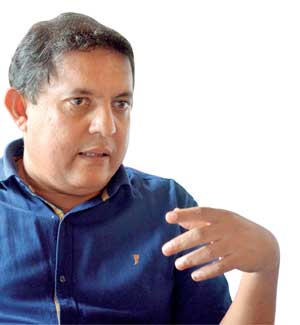Reply To:
Name - Reply Comment
Last Updated : 2024-04-26 02:12:00

In the backdrop of the ongoing Constitution-making process, civil society activist Sudarshana Gunawardane, who advocates pluralism and multiculturalism, says such concepts will not harm the entrenched traditions of the country. Mr. Gunawardane, who is also the executive director of Right Now Collective for Democracy, made these remarks in the context of fear over the attempts to dilute the Sinhala-Buddhist identity of the country. Excerpts of the interview:
"When the Sinhala-Buddhists stress themselves, the minorities living among them feel threatened. That will have an impact in the North and East where the country’s minority is the majority"
"In my view, identity is very fluid. It is moving. It can apply to a person or a nation. The outer appearance can always be deceptive. It does not correspond with the inner substance"
"If the tradition is entrenched, we need not worry. I do not think multiculturalism can harm the uniqueness of our country. In a globalized society, we have to act positively"
Q As a civil society leader, how do you describe the ‘Sri Lankan identity’ in efforts to Implement Constitutional changes?
To me, the Sri Lankan identity is open to change. Some people refer to our history starting with Ravana. This epic says Ravana went to India and returned with Sita. Then came Rama. There is also a story about Vibhishana helping Rama. Later, Ravana was defeated. Sri Lanka was not destroyed but subjected to change, and Vibhishana reigned the country.
You talk about the arrival of King Vijaya, a prince from India. He encountered with the local culture. Finally, Vijaya reigned. We never called Vijaya and Vibhishana outsiders. We led the culture. Due to our geographical location, we were subjected to various forms of invasions. But we managed them. The most important example is Buddhism that arrived from India. When the ruling king decided to embrace it in line with ancient geopolitical conditions, we transformed ourselves according to Buddhism. At that time, nobody argued that we had a strong traditional cultural identity to be compromised with the advent of Buddhism. Another example is how the Anuradhapura kingdom withstood invasions for thousands of years. The ruling nobles in Anuradhapura adapted themselves when the invaders arrived. They did not leave room for invaders to destroy the civilization. But then came Kalinga Magha, a lunatic. Any other invader could be dealt with and managed.
It happened knowing that we were a small island nation vulnerable to invasions of geopolitical realities. Kalinga Magha came and destroyed key chieftains who were the guardians of our ancient irrigation system. Once they were ruined, there remained none to take care of irrigation activities. Then, the whole kingdom was rendered inoperable.
Q You advocate pluralism and multiculturalism. Yet, there is the uniqueness about the Sinhala-Buddhist culture here. How do you respond? 
I think it is unique, but not in the sense most believe in. In my view, identity is very fluid. It is moving. It can apply to a person or a nation. The outer appearance can always be deceptive. It does not correspond with the inner substance. Likewise, there is uniqueness. My argument is that uniqueness remains with adaptability. Many people say it is unique and fixed. We have taken some aspects 2,500 years ago. If you examine, you can see the change. If you look at our clothing pattern, we know how it evolved.
"If we take our national attire for example, it has been introduced very late from outside. The sarong is Indian. We have the Kandyan Mul Anduma. Although we consider it ours, it was worn by the kings who arrived from India. What we wear is not Sinhalese in the original context. But, they have become Sinhalised. To me, there is uniqueness in identity. Yet, it lies with adaptability. Identity is formed by outsiders. Now, we quote Robert Knox. He said a farmer was even fit for royalty once the mud on his body was washed off. That was what Robert Knox said in a bigger context. We say the same. He said it in a different context, and we have taken it out of the original context."
Q The Sinhala culture was born here with the advent of Buddhism. Then, there is a special place for it. How do you respond?
The Sinhala language is something very close to my heart. Among many civil society leaders, I am one hailing from a village in the South. I studied in the Sinhala medium up to secondary education. It is a language dear to my mind. I mostly communicate in Sinhala. I talk to the Sinhala audience. There is uniqueness because this is the only place the language is used. We have a duty to protect it. I can communicate clearly in Sinhala, my mother tongue. Therefore, it is unique for me. But, as a small island nation, our level of production has always been low compared with mainland, India. It has been very high outside the country. As for our ancient irrigation system, though we managed it well, it came from outside. A lot of words associated with the production process were introduced.
That is how we got a lot of Prakrit words introduced. In our day-to-day usage, we find a lot of words borrowed from other languages. The beauty here is that we managed to get these words and make them ours. Our language has become very rich because of such words.
We are getting increasingly adapted to English. We need to take concrete measures to foster the language as it is the basis of identity. The language is not discriminatory. The written language is something anyone could get adapted to. As for Ven. S. Mahinda Thera, we never think of him as an outsider. He wrote in Sinhala. The language is a unifying factor.
Q You are a civil society leader working for Constitutional changes on the premise that they should reflect pluralist and multicultural identity of Sri Lanka. How do you comment on it?
Multiculturalism is something you embrace as it is. A good example is Barrack Hussein Obama who became the US President. He represented the Democratic Party, one of the traditional parties, which agreed to give him nomination. He comes from a multicultural background. His father is an immigrant and the mother a US citizen. He has some Muslim connection too. Still, he managed to become the Head of State. He even managed to get re-elected for a second term. I do not think multiculturalism will harm traditions.
If the tradition is entrenched, we need not worry. I do not think multiculturalism can harm the uniqueness of our country. In a globalized society, we have to act positively. In globalization, English, as a language, is becoming prominent more and more. We cannot disregard it. We have to get it and refine it to suit our system. We have been doing it all the time. My point is that we need not fear it. We have to take positive steps. For example, we have to consider our language as an endangered element. We must specifically put some efforts to uplift its status. A lot of research has to be undertaken. The Sinhala Language Department has limited funds though we claim about it. We must spend money to develop it.
We believe that if the State becomes Sinhala-Buddhist, things will be alright. We became an Independent nation in 1948. There was a big issue about Bamunu Kulaya (Elitist Strata). In 1956, we were able to defeat it. After 60 years, what has happened? The State is not efficient enough to handle it. There are people conscious and committed to uplift our culture or language. The State should support them in terms of funding and other resources. Being a small country, it is very difficult to do certain things. Being an island, one cannot breach our physical boundaries. Yet, we cannot resist the invasion of technology. With just a phone call, we get connected with the outside world. It is difficult even for the US to stop such invasions. In the US, Mr. Trump was elected the President.
Any leader is a reflection of a social phenomenon. People there felt they could not defend their Sovereignty, culture and so forth. As for China, it purchases Pine trees from the US to manufacture furniture. Again, furniture is exported to the US. US manufacturers are in a dilemma. Globalization was initiated by the West. And now, the originator himself is trying to stop it. China benefited from globalization more than any other country, despite it being a State founded on Communist ideals. Now, the US has to build walls against globalization. It shows changes in nations. Even President Trump finds it difficult to deliver on what he spoke about before. Mr. Obama also could not do it.
Q There is a school of thought that multiculturalism will dilute the Sinhala-Buddhist identity. What are your thoughts?
A majority 75 per cent of our population is Sinhalese and 70 per cent Sinhala-Buddhist. When the Sinhala-Buddhists stress themselves too much, the minorities living among them feel threatened. That will have an impact in the North and East where the country’s minority is the majority. They will start doing the same. That competition will damage the minorities living along with the Sinhalese in other parts. Ultimately, the Sinhalese and Muslims living in the North and the East will also enter the picture. Therefore, we have to come to a compromise. Human Rights are a right framework for that. We have to guarantee a system where everybody has equal protection. Then, the Sinhalese will also not have to feel intimidated as even in the North, the Tamils cannot get supremacy.
Q Fundamental Rights are guaranteed for all despite their ethnicities even in the present Constitution. Aren’t they?
That is true. That is a first step. Fundamental Rights are guaranteed. Equality is there. When enacting legislation, any Bill can be challenged in the Supreme Court. The court rules on its Constitutionality and says whether it should be passed by a two-thirds majority or even with a referendum. Though we pass laws, there are laws such as Thesavalamai, some provisions of the Penal Code and the Muslim laws contrary to the principles of equality. We have a dual situation. We have to bring all these laws into a uniform system.
Q How optimistic are you of the Constitution-making process?
I am very positive because the forces this time have a strong political support. First, the campaign by the then combined opposition for Constitutional reforms at the presidential election secured a mandate. It got the support of the wider cross section of society including Tamils, Muslims, upcountry Tamils and the majority Sinhalese. In the past, they were away from any Constitution-making process. This is a homegrown process. Parliament is deliberating. There is a greater chance. We will be able to come to a compromise.

Add comment
Comments will be edited (grammar, spelling and slang) and authorized at the discretion of Daily Mirror online. The website also has the right not to publish selected comments.
Reply To:
Name - Reply Comment
US authorities are currently reviewing the manifest of every cargo aboard MV
On March 26, a couple arriving from Thailand was arrested with 88 live animal
According to villagers from Naula-Moragolla out of 105 families 80 can afford
Is the situation in Sri Lanka so grim that locals harbour hope that they coul